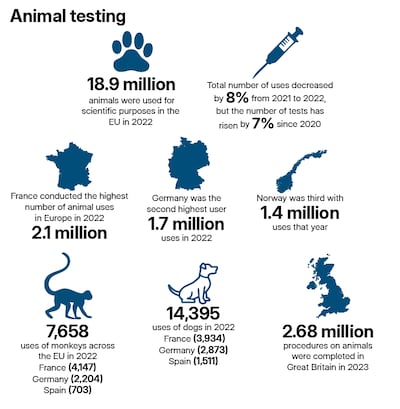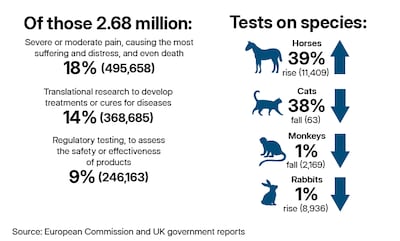Animal testing remains widespread, but the long history of campaigning against it has made some inroads, with some sectors pioneering alternative methods and scientists highlighting its shortcomings.
A significant number of animals continue to be used for testing, with Humane Society International saying that more than 115 million are used in labs around the world each year.
The pharmaceutical sector tops the list of users, with companies including Pfizer claiming that animals "provide important insights into how a disease works within the body", which can help efforts to discover and develop drugs.
Dr Jamila Louahed, global head of research and development for therapeutic vaccines at pharmaceutical company GSK said animal testing was crucial for clinical trials. "We don’t do it for fun," said Dr Louahed, who is also head of research and development at the company's site at Rixensart in Belgium. "We do it to generate the right data."
Big fight
Next year will mark 150 years since the National Anti-Vivisection Society was founded in London to campaign against the cruelty inflicted on animals in the name of science. Dr Alan Bates, in his book Anti-Vivisection and the Profession of Medicine in Britain: A Social History, said campaigners "raised petitions with hundreds of thousands of signatures, more than for any other cause of the time".
Animals are subjected to a wide variety of procedures, including force-feeding of chemicals for toxicity testing, exposure to infectious diseases and infliction of wounds or burns to study healing, Humane Society International said.
Cruelty Free International said animals that do not die as a result of procedures are routinely killed afterwards.
Mice accounted for the majority of animals used in testing, but the group said more than 200,000 dogs and more than 150,000 non-human primates were used in 2015. It added that the number of animals used for science globally hit 192.1 million that year.
In 2022, about 9.3 million animals were used in experiments in the EU and Norway, with about 40 per cent subjected to moderate suffering and 9.2 per cent facing severe suffering. In the EU and Norway, 12 per cent of the animals were used in research required by regulators, while 33 per cent were used in studies classed as basic research.
Research centres use significant numbers, with the Francis Crick Institute in London using 192,920 animals in 2023. "When there is no non-animal alternative, it is necessary for researchers to continue to develop new complex animal models and experimental platforms, based on the most current data, that reflect human conditions," said Dr Sara Wells, the institute’s chief biological research facility officer.
Drop in numbers
Although the pharmaceutical sector accounts for 20 per cent of animals used in research in Europe, that is down from 30 per cent in 2005, Frontiers in Drug Discovery said in a paper published in April.
The paper’s author, Prof Thomas Hartung of Johns Hopkins University in the US, said the sector "pioneered many alternative methods and been early adopters of new technologies to reduce animal use".
Pharmaceutical company Novartis and external contractors dropped the use of animals in their testing from 500,000 in 2018 to slightly less than 400,000 in 2022. Dr Louahed also confirmed that GSK’s use of animals "decreased by up to 80 per cent" in the past decade. This was largely because of new technology, such as organoids, small organ-like structures generated in the laboratory, she added.
Low success rate
Prof Andrew Knight, a veterinary surgeon and author of the book The Costs and Benefits of Animal Experiments, said that using animals in tests hampered the pharmaceutical sector. He suggested that the low success rate of drugs in clinical trials – during which about 90 per cent fail, according to the American Society for Biochemistry and Molecular Biology – was because using animals to test medications gave results that were not applicable to people.
"The drugs that get [to clinical trials] have generally gone through preclinical testing on animal models, but nine-tenths fail at the human stage because they’re not considered to be safe or effective," Prof Knight said. "It indicates animal models are not very predictive for humans."
Many procedures tested on animals are not for purposes that could lead to significant life-saving or welfare benefits for people, campaigners say. For example, what are described as batch potency tests were carried out on more than 150,000 mice in the EU and Norway in 2022, according to figures published by CFI, a large proportion for products including Botox. Toxicity tests and eye irritancy tests are among the most controversial procedures.
Test requirements
Some animal tests are carried out because of requirements by regulators including the US Food and Drug Administration. Dr Louahed said the company "worked with regulators to make sure they accept there are alternatives to animal use", but that regulators in countries such as China tended to retain requirements for animal tests, more than in other parts of the world.
"We’re going step by step to make them more confident … that the data [without using animals] are sufficient," she said. "There’s this change of mindset that’s happened that you hope will be more uniform across the world."
In a statement, Pfizer said: "There are currently no alternatives acceptable to regulatory authorities that fully replace animal research. Any research involving animals is conducted only after appropriate ethical consideration and review. This review ensures that we provide a high level of care to all animals used, and that a scientifically appropriate and validated alternative to the use of animals is not available."
Prof Knight said regulators often required animal tests because "they don’t want to take risks". "Doing something different is a risk," he added. "They need to be looking at the evidence and recognising the high failure of animal models in successfully predicting the outcome for human patients."
While animal studies often require approval from ethics committees, such as those set up by research institutions or universities, he said researchers inflated the probable benefits to gain approval.
"These experiments are routinely being approved on the basis of unfounded claims of their likely human benefits," he said. "Without these claims they probably wouldn’t be approved because they’re invasive, often involving the deaths of animals."
More than a century on from the beginnings of the anti-vivisection movement, the experiments continue, as does the debate surrounding them.
Killing of Qassem Suleimani
The%20specs
%3Cp%3E%3Cstrong%3EEngine%3A%20%3C%2Fstrong%3ETwin-turbo%2C%20V8%3Cbr%3E%3Cstrong%3ETransmission%3A%20%3C%2Fstrong%3E8-speed%20automatic%20and%20manual%3Cbr%3E%3Cstrong%3EPower%3A%20%3C%2Fstrong%3E503%20bhp%3Cbr%3E%3Cstrong%3ETorque%3A%20%3C%2Fstrong%3E513Nm%3Cbr%3E%3Cstrong%3EPrice%3A%20%3C%2Fstrong%3Efrom%20Dh646%2C800%20(%24176%2C095)%3Cbr%3E%3Cstrong%3EOn%20sale%3A%20%3C%2Fstrong%3Enow%3C%2Fp%3E%0A
More on animal trafficking
Killing of Qassem Suleimani
Mohammed bin Zayed Majlis
More from Neighbourhood Watch
HIJRA
Starring: Lamar Faden, Khairiah Nathmy, Nawaf Al-Dhufairy
Director: Shahad Ameen
Rating: 3/5
Killing of Qassem Suleimani
The specs
Engine: Dual 180kW and 300kW front and rear motors
Power: 480kW
Torque: 850Nm
Transmission: Single-speed automatic
Price: From Dh359,900 ($98,000)
On sale: Now
The%20specs%3A%202024%20Mercedes%20E200
%3Cp%3E%3Cstrong%3EEngine%3A%20%3C%2Fstrong%3E2.0-litre%20four-cyl%20turbo%20%2B%20mild%20hybrid%0D%3Cbr%3E%3Cstrong%3EPower%3A%20%3C%2Fstrong%3E204hp%20at%205%2C800rpm%20%2B23hp%20hybrid%20boost%0D%3Cbr%3E%3Cstrong%3ETorque%3A%20%3C%2Fstrong%3E320Nm%20at%201%2C800rpm%20%2B205Nm%20hybrid%20boost%0D%3Cbr%3E%3Cstrong%3ETransmission%3A%20%3C%2Fstrong%3E9-speed%20auto%0D%3Cbr%3E%3Cstrong%3EFuel%20consumption%3A%20%3C%2Fstrong%3E7.3L%2F100km%0D%3Cbr%3E%3Cstrong%3EOn%20sale%3A%20%3C%2Fstrong%3ENovember%2FDecember%0D%3Cbr%3E%3Cstrong%3EPrice%3A%20%3C%2Fstrong%3EFrom%20Dh205%2C000%20(estimate)%3C%2Fp%3E%0A
The%20specs
%3Cp%3E%3Cstrong%3EEngine%3A%3C%2Fstrong%3E%20Dual%20synchronous%20electric%20motors%0D%3Cbr%3E%3Cstrong%3EPower%3A%20%3C%2Fstrong%3E660hp%0D%3Cbr%3E%3Cstrong%3ETorque%3A%20%3C%2Fstrong%3E1%2C100Nm%0D%3Cbr%3E%3Cstrong%3ETransmission%3A%20%3C%2Fstrong%3ESingle-speed%20automatic%0D%3Cbr%3E%3Cstrong%3ETouring%20range%3A%20%3C%2Fstrong%3E488km-560km%0D%3Cbr%3E%3Cstrong%3EPrice%3A%20%3C%2Fstrong%3EFrom%20Dh850%2C000%20(estimate)%0D%3Cbr%3E%3Cstrong%3EOn%20sale%3A%20%3C%2Fstrong%3EOctober%3C%2Fp%3E%0A
The%20specs
%3Cp%3E%3Cstrong%3EEngine%3A%20%3C%2Fstrong%3E4.0-litre%20twin-turbo%20V8%0D%3Cbr%3E%3Cstrong%3EPower%3A%20%3C%2Fstrong%3E640hp%20at%206%2C000rpm%0D%3Cbr%3E%3Cstrong%3ETorque%3A%20%3C%2Fstrong%3E850Nm%20from%202%2C300-4%2C500rpm%0D%3Cbr%3E%3Cstrong%3ETransmission%3A%20%3C%2Fstrong%3E8-speed%20auto%0D%3Cbr%3E%3Cstrong%3EFuel%20consumption%3A%20%3C%2Fstrong%3E11.9L%2F100km%0D%3Cbr%3E%3Cstrong%3EPrice%3A%20%3C%2Fstrong%3EDh749%2C800%0D%3Cbr%3E%3Cstrong%3EOn%20sale%3A%20%3C%2Fstrong%3Enow%3C%2Fp%3E%0A
The years Ramadan fell in May
Read more from Aya Iskandarani
ESSENTIALS
The flights
Emirates flies direct from Dubai to Rio de Janeiro from Dh7,000 return including taxes. Avianca fliles from Rio to Cusco via Lima from $399 (Dhxx) return including taxes.
The trip
From US$1,830 per deluxe cabin, twin share, for the one-night Spirit of the Water itinerary and US$4,630 per deluxe cabin for the Peruvian Highlands itinerary, inclusive of meals, and beverages. Surcharges apply for some excursions.
The years Ramadan fell in May
The specs
- Engine: 3.9-litre twin-turbo V8
- Power: 640hp
- Torque: 760nm
- On sale: 2026
- Price: Not announced yet
Killing of Qassem Suleimani
What can victims do?
Always use only regulated platforms
Stop all transactions and communication on suspicion
Save all evidence (screenshots, chat logs, transaction IDs)
Report to local authorities
Warn others to prevent further harm
Courtesy: Crystal Intelligence
AI traffic lights to ease congestion at seven points to Sheikh Zayed bin Sultan Street
The seven points are:
Shakhbout bin Sultan Street
Dhafeer Street
Hadbat Al Ghubainah Street (outbound)
Salama bint Butti Street
Al Dhafra Street
Rabdan Street
Umm Yifina Street exit (inbound)
Key findings of Jenkins report
- Founder of the Muslim Brotherhood, Hassan al Banna, "accepted the political utility of violence"
- Views of key Muslim Brotherhood ideologue, Sayyid Qutb, have “consistently been understood” as permitting “the use of extreme violence in the pursuit of the perfect Islamic society” and “never been institutionally disowned” by the movement.
- Muslim Brotherhood at all levels has repeatedly defended Hamas attacks against Israel, including the use of suicide bombers and the killing of civilians.
- Laying out the report in the House of Commons, David Cameron told MPs: "The main findings of the review support the conclusion that membership of, association with, or influence by the Muslim Brotherhood should be considered as a possible indicator of extremism."
The years Ramadan fell in May
KILLING OF QASSEM SULEIMANI
Farage on Muslim Brotherhood
Nigel Farage told Reform's annual conference that the party will proscribe the Muslim Brotherhood if he becomes Prime Minister.
"We will stop dangerous organisations with links to terrorism operating in our country," he said. "Quite why we've been so gutless about this – both Labour and Conservative – I don't know.
“All across the Middle East, countries have banned and proscribed the Muslim Brotherhood as a dangerous organisation. We will do the very same.”
It is 10 years since a ground-breaking report into the Muslim Brotherhood by Sir John Jenkins.
Among the former diplomat's findings was an assessment that “the use of extreme violence in the pursuit of the perfect Islamic society” has “never been institutionally disowned” by the movement.
The prime minister at the time, David Cameron, who commissioned the report, said membership or association with the Muslim Brotherhood was a "possible indicator of extremism" but it would not be banned.
Mohammed bin Zayed Majlis
Key facilities
- Olympic-size swimming pool with a split bulkhead for multi-use configurations, including water polo and 50m/25m training lanes
- Premier League-standard football pitch
- 400m Olympic running track
- NBA-spec basketball court with auditorium
- 600-seat auditorium
- Spaces for historical and cultural exploration
- An elevated football field that doubles as a helipad
- Specialist robotics and science laboratories
- AR and VR-enabled learning centres
- Disruption Lab and Research Centre for developing entrepreneurial skills
Killing of Qassem Suleimani
UAE currency: the story behind the money in your pockets
Mohammed bin Zayed Majlis
Read more about the coronavirus
Zayed Sustainability Prize
Sly%20Cooper%20and%20the%20Thievius%20Raccoonus
%3Cp%3E%3Cstrong%3EDeveloper%3A%3C%2Fstrong%3E%20Sucker%20Punch%20Productions%3Cbr%3E%3Cstrong%3EPublisher%3A%3C%2Fstrong%3E%20Sony%20Computer%20Entertainment%3Cbr%3E%3Cstrong%3EConsole%3A%3C%2Fstrong%3E%20PlayStation%202%20to%205%3Cbr%3E%3Cstrong%3ERating%3A%3C%2Fstrong%3E%205%2F5%3C%2Fp%3E%0A
How to book
Call DHA on 800342
Once you are registered, you will receive a confirmation text message
Present the SMS and your Emirates ID at the centre
DHA medical personnel will take a nasal swab
Check results within 48 hours on the DHA app under ‘Lab Results’ and then ‘Patient Services’
From Zero
Artist: Linkin Park
Label: Warner Records
Number of tracks: 11
Rating: 4/5
More from Neighbourhood Watch:
COPA DEL REY
Semi-final, first leg
Barcelona 1 (Malcom 57')
Real Madrid (Vazquez 6')
Second leg, February 27
The%C2%A0specs%20
%3Cp%3E%0D%3Cstrong%3EEngine%3A%20%3C%2Fstrong%3E6-cylinder%2C%204.8-litre%20%0D%3Cbr%3E%3Cstrong%3ETransmission%3A%20%3C%2Fstrong%3E5-speed%20automatic%20and%20manual%0D%3Cbr%3E%3Cstrong%3EPower%3A%20%3C%2Fstrong%3E280%20brake%20horsepower%20%0D%3Cbr%3E%3Cstrong%3ETorque%3A%20%3C%2Fstrong%3E451Nm%20%0D%3Cbr%3E%3Cstrong%3EPrice%3A%20%3C%2Fstrong%3Efrom%20Dh153%2C00%0D%3Cbr%3E%3Cstrong%3EOn%20sale%3A%20%3C%2Fstrong%3Enow%3C%2Fp%3E%0A
The burning issue
The internal combustion engine is facing a watershed moment – major manufacturer Volvo is to stop producing petroleum-powered vehicles by 2021 and countries in Europe, including the UK, have vowed to ban their sale before 2040. The National takes a look at the story of one of the most successful technologies of the last 100 years and how it has impacted life in the UAE.
Read part four: an affection for classic cars lives on
Read part three: the age of the electric vehicle begins
Read part one: how cars came to the UAE
Killing of Qassem Suleimani
The five pillars of Islam
1. Fasting
2. Prayer
3. Hajj
4. Shahada
5. Zakat
World Cup final
Who: France v Croatia
When: Sunday, July 15, 7pm (UAE)
TV: Game will be shown live on BeIN Sports for viewers in the Mena region
What are the influencer academy modules?
- Mastery of audio-visual content creation.
- Cinematography, shots and movement.
- All aspects of post-production.
- Emerging technologies and VFX with AI and CGI.
- Understanding of marketing objectives and audience engagement.
- Tourism industry knowledge.
- Professional ethics.
What is cyberbullying?
Cyberbullying or online bullying could take many forms such as sending unkind or rude messages to someone, socially isolating people from groups, sharing embarrassing pictures of them, or spreading rumors about them.
Cyberbullying can take place on various platforms such as messages, on social media, on group chats, or games.
Parents should watch out for behavioural changes in their children.
When children are being bullied they they may be feel embarrassed and isolated, so parents should watch out for signs of signs of depression and anxiety
Company%20profile
%3Cp%3E%3Cstrong%3EName%3A%3C%2Fstrong%3E%20Yabi%20by%20Souqalmal%C2%A0%3C%2Fp%3E%0A%3Cp%3E%3Cstrong%3EStarted%3A%20%3C%2Fstrong%3EMay%202022%2C%20launched%20June%202023%3C%2Fp%3E%0A%3Cp%3E%3Cstrong%3EFounder%3A%20%3C%2Fstrong%3EAmbareen%20Musa%3C%2Fp%3E%0A%3Cp%3E%3Cstrong%3EBased%3A%20%3C%2Fstrong%3EDubai%C2%A0%3C%2Fp%3E%0A%3Cp%3E%3Cstrong%3ESector%3A%20%3C%2Fstrong%3EFinTech%C2%A0%3C%2Fp%3E%0A%3Cp%3E%3Cstrong%3EInitial%20investment%3A%20u%3C%2Fstrong%3Endisclosed%20but%20soon%20to%20be%20announced%C2%A0%3C%2Fp%3E%0A%3Cp%3E%3Cstrong%3ENumber%20of%20staff%3A%20%3C%2Fstrong%3E12%C2%A0%3C%2Fp%3E%0A%3Cp%3E%3Cstrong%3EInvestment%20stage%3A%20%3C%2Fstrong%3Eseed%C2%A0%C2%A0%3C%2Fp%3E%0A%3Cp%3E%3Cstrong%3EInvestors%3A%20%3C%2Fstrong%3EShuaa%20Capital%3C%2Fp%3E%0A
Living in...
This article is part of a guide on where to live in the UAE. Our reporters will profile some of the country’s most desirable districts, provide an estimate of rental prices and introduce you to some of the residents who call each area home.
BIOSAFETY LABS SECURITY LEVELS
Biosafety Level 1
The lowest safety level. These labs work with viruses that are minimal risk to humans.
Hand washing is required on entry and exit and potentially infectious material decontaminated with bleach before thrown away.
Must have a lock. Access limited. Lab does not need to be isolated from other buildings.
Used as teaching spaces.
Study microorganisms such as Staphylococcus which causes food poisoning.
Biosafety Level 2
These labs deal with pathogens that can be harmful to people and the environment such as Hepatitis, HIV and salmonella.
Working in Level 2 requires special training in handling pathogenic agents.
Extra safety and security precautions are taken in addition to those at Level 1
Biosafety Level 3
These labs contain material that can be lethal if inhaled. This includes SARS coronavirus, MERS, and yellow fever.
Significant extra precautions are taken with staff given specific immunisations when dealing with certain diseases.
Infectious material is examined in a biological safety cabinet.
Personnel must wear protective gowns that must be discarded or decontaminated after use.
Strict safety and handling procedures are in place. There must be double entrances to the building and they must contain self-closing doors to reduce risk of pathogen aerosols escaping.
Windows must be sealed. Air from must be filtered before it can be recirculated.
Biosafety Level 4
The highest level for biosafety precautions. Scientist work with highly dangerous diseases that have no vaccine or cure.
All material must be decontaminated.
Personnel must wear a positive pressure suit for protection. On leaving the lab this must pass through decontamination shower before they have a personal shower.
Entry is severely restricted to trained and authorised personnel. All entries are recorded.
Entrance must be via airlocks.
Wayne Rooney's career
Everton (2002-2004)
- Appearances: 48
- Goals: 17
Manchester United (2004-2017)
- Appearances: 496
- Goals: 253
England (2003-)
- Appearances: 119
- Goals: 53
The%20Letter%20Writer
%3Cp%3E%3Cstrong%3EDirector%3A%3C%2Fstrong%3E%20Layla%20Kaylif%3C%2Fp%3E%0A%3Cp%3E%3Cstrong%3EStars%3A%3C%2Fstrong%3E%20Eslam%20Al%20Kawarit%2C%20Rosy%20McEwen%2C%20Muhammad%20Amir%20Nawaz%3C%2Fp%3E%0A%3Cp%3E%3Cstrong%3ERating%3A%3C%2Fstrong%3E%202%2F5%3C%2Fp%3E%0A
Zayed Sustainability Prize
More from Neighbourhood Watch:






